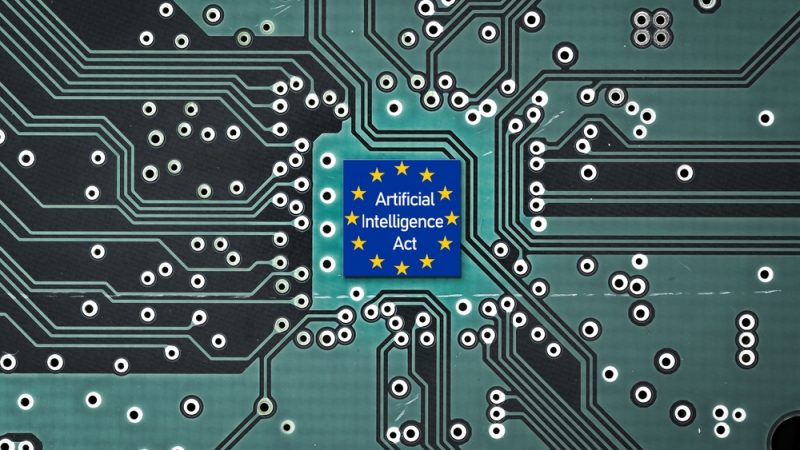As it waits for the AI Act to take effect, Brussels should use its existing powers under competition law and the Digital Markets Act to challenge Big Tech’s growing influence over AI, writes Max von Thun.
Max von Thun is the director of Europe & transatlantic partnerships at the Open Markets Institute, an anti-monopoly think tank. He leads Open Markets’ research and advocacy in Europe, alongside efforts to foster greater transatlantic collaboration on tackling monopoly power.
At the end of last year, negotiators finally agreed on the AI Act after many months of protracted negotiations. The EU deserves credit for passing what stands as the world’s first serious effort to impose binding guardrails on artificial intelligence, including the foundation models that are currently at the centre of attention.
Recent reports have raised the prospect that last year’s deal could still unravel due to opposition from a few stubborn member states. But putting this worrying possibility aside, the AI Act will still take several years to have a meaningful impact. The Act’s obligations for General Purpose AI Systems will not take effect until the middle of next year at the earliest, while most of its provisions will only apply from mid-2026 onwards.
Given the speed and scale with which artificial intelligence is developing and being rolled out, waiting until the AI Act applies to take action is not an option for Europe. Already, a handful of tech giants are exploiting their existing dominance over computing infrastructure, data, and talent to seize control of the emerging AI ecosystem, including co-opting potential challengers through exclusive partnerships and investments.
This Big Tech-led AI arms race is already amplifying many of today’s online harms, including disinformation, surveillance advertising, anti-competitive conduct, and the undermining of copyright and privacy. But it is also likely to create new ones, as the promise of this new technology is distorted by a monopolistic market structure and the toxic business models of a few gatekeepers.
The good news is that Brussels doesn’t need to wait for the AI Act to start shaping the technology’s future for the better. It already possesses powerful tools that it could use right now to promote a fairer, safer, and more open AI ecosystem. These tools include its wide-ranging powers to police mergers, monopolistic conduct, anti-competitive agreements, and the recently introduced Digital Markets Act (DMA).
Take the lucrative partnerships and investments the tech giants use to neutralise or co-opt potential competitors. Microsoft’s $13 billion partnership with OpenAI is the most high-profile example of this tactic, but it is far from the only one. Amazon and Google have collectively invested around $6 billion into Anthropic, while Nvidia is funding the likes of Inflection and Cohere. Left unchallenged, these deals threaten to accelerate concentration in AI, weaken innovation, and leave businesses and consumers with less choice.
While seemingly structured to avoid merger scrutiny, the scale and scope of these arrangements suggest they may still merit scrutiny under the EU’s Merger Regulation, as the Commission’s preliminary review of the Microsoft/OpenAI partnership indicates. Where this isn’t the case, the Commission should explore other avenues, including investigating them as anti-competitive agreements under Article 101 of the Treaty on the Functioning of the European Union (TFEU) or simply updating the Merger Regulation to ensure it captures such investments and partnerships.
Given Big Tech’s track record of using anti-competitive practices to corner and dominate emerging digital technologies, we should not be surprised to see them deploy the same tactics about AI. Extreme concentration in semiconductors, cloud computing, foundation models, and other parts of the AI technology stack will give dominant players the incentive and ability to abuse their power in unfair and exploitative ways. For example, a dominant cloud platform could bundle or promote its own foundation model at the expense of rival offerings, while a dominant foundation model provider could cut off or degrade API access to rival application developers.
Here, as well, the EU already has plenty of ways of fighting back. Article 102 of the TFEU allows the Commission to investigate abusive behaviour by dominant firms, which the above examples would almost certainly qualify as. Where such conduct is proven, the Commission can take forceful measures, including forcing companies to divest assets and business divisions. Historically, however, Article 102 has not successfully tackled concentration in digital markets. This is partly due to the inherently backwards-facing (ex-post) nature of the law but also because of the Commission’s regrettable reluctance to use the toughest remedies available.
This is where the DMA – itself designed in response to the failures of traditional antitrust enforcement – comes in. Unlike the latter, the DMA does not require conclusive proof of monopolistic conduct but simply mandates or prohibits specific practices for dominant digital platforms designated as “gatekeepers” under the legislation. This is precisely what is needed when it comes to fast-evolving digital technologies such as AI, a space developing so rapidly that by the time enforcers are able to prove illegal conduct, competition is likely to have already been extinguished.
Unfortunately, the DMA’s ability to prevent the monopolisation of AI is seriously hamstrung because neither cloud computing nor foundation models are currently covered by the new rules. While cloud computing is listed as a “core platform service” under the DMA, it was not included in the initial batch of designations announced by the Commission last September. Foundation models are not mentioned at all, perhaps unsurprisingly, given negotiations on the legislation predated widespread awareness of the technology.
If the DMA is to remain capable of achieving its core objective of protecting contestability in digital markets, the Commission must move swiftly to designate today’s dominant cloud services as gatekeepers while bringing foundation models under the purview of the legislation. Forward-looking enforcement of the DMA, combined with robust application of the EU’s traditional competition powers, gives us the best chance of ensuring that by the time the AI Act takes effect, there are more than just a handful of tech giants left to comply with it.



